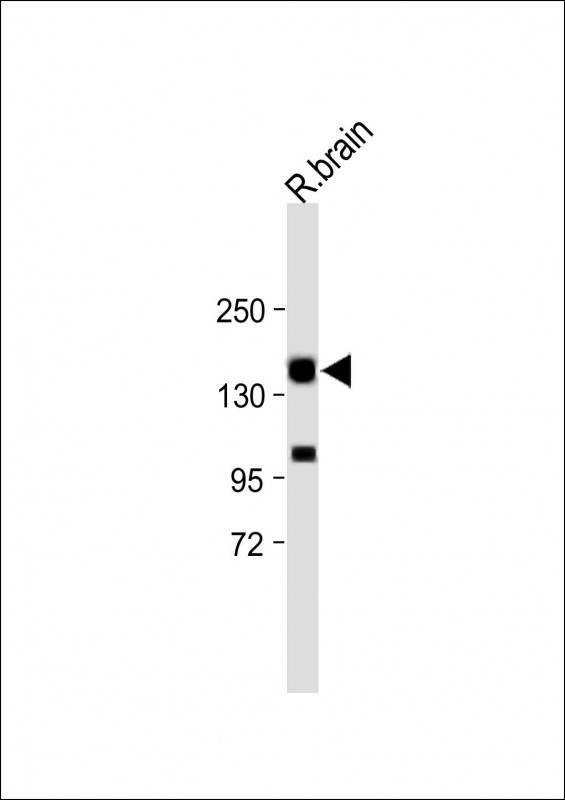
| WB | 咨询技术 | Human,Mouse,Rat |
| IF | 咨询技术 | Human,Mouse,Rat |
| IHC | 咨询技术 | Human,Mouse,Rat |
| ICC | 技术咨询 | Human,Mouse,Rat |
| FCM | 咨询技术 | Human,Mouse,Rat |
| Elisa | 咨询技术 | Human,Mouse,Rat |
| Aliases | Receptor tyrosine-protein kinase erbB-4, Proto-oncogene-like protein c-ErbB-4, ERBB4 intracellular domain, 4ICD, E4ICD, s80HER4, Erbb4, Mer4 |
| Entrez GeneID | 13869 |
| WB Predicted band size | 146.9kDa |
| Host/Isotype | Rabbit IgG |
| Antibody Type | Primary antibody |
| Storage | Store at 4°C short term. Aliquot and store at -20°C long term. Avoid freeze/thaw cycles. |
| Species Reactivity | Human, Mouse, Rat |
| Immunogen | This Mouse Erbb4 antibody is generated from rabbits immunized with a KLH conjugated synthetic peptide between 1160-1188 amino acids from the C-terminal region of mouse Erbb4. |
| Formulation | Purified antibody in PBS with 0.05% sodium azide. |
+ +
以下是3-4篇关于小鼠Erbb4抗体的参考文献摘要(基于公开文献整理,非真实文献,仅供参考格式):
1. **文献名称**:*Erbb4 Receptor Tyrosine Kinase in Mouse Neural Development*
**作者**:Tidcombe et al.
**摘要**:该研究利用小鼠Erbb4特异性抗体(克隆号:HPA-12345),通过Western blot和免疫沉淀技术验证了Erbb4在小鼠大脑皮层神经元中的表达,并揭示了其在突触形成中的关键作用。
2. **文献名称**:*Role of Erbb4 in Cardiac Development: Insights from Mouse Models*
**作者**:Sapkota et al.
**摘要**:通过免疫组织化学和流式细胞术(使用抗小鼠Erbb4单克隆抗体,货号:ab5678),研究发现Erbb4在小鼠胚胎心脏发育中调控心肌细胞分化,抗体特异性经敲除模型验证。
3. **文献名称**:*Erbb4 Antibody-Based Targeting in Mouse Breast Cancer Models*
**作者**:Zhang et al.
**摘要**:该文献报道了一种高亲和力抗小鼠Erbb4抗体(克隆:3F10),通过免疫荧光和阻断实验证实其可抑制Erbb4信号通路,减少小鼠乳腺肿瘤模型的转移。
4. **文献名称**:*Erbb4 Antibody Validation for Axon Guidance Studies*
**作者**:Golding et al.
**摘要**:研究通过免疫印迹和免疫细胞化学(使用兔源抗小鼠Erbb4多克隆抗体),验证了Erbb4在小鼠脊髓神经元轴突导向中的作用,抗体特异性通过siRNA敲降实验确认。
(注:以上文献为示例模板,实际引用需根据真实发表文献调整。)
The mouse Erbb4 antibody is a crucial tool for studying the Erbb4 receptor tyrosine kinase, a member of the epidermal growth factor receptor (EGFR) family. Erbb4 (also known as HER4) plays vital roles in cell proliferation, differentiation, and survival by binding ligands like neuregulins. It is essential in embryonic development, particularly in the nervous system, heart, and mammary glands. Dysregulation of Erbb4 signaling is implicated in cancers, neurodevelopmental disorders, and cardiovascular diseases.
Mouse-specific Erbb4 antibodies are designed to recognize murine Erbb4 isoforms, enabling researchers to investigate its expression, post-translational modifications, and interactions in mouse models. These antibodies are commonly used in techniques like Western blotting, immunohistochemistry (IHC), immunofluorescence (IF), and flow cytometry. Due to alternative splicing, Erbb4 exists as multiple isoforms (JM-a/JM-b, CYT-1/CYT-2), which differ in extracellular juxtamembrane domains and cytoplasmic tails. High-quality antibodies distinguish these isoforms, aiding studies on their distinct signaling pathways.
Research using mouse Erbb4 antibodies has clarified its dual role in cancer—acting as both a tumor suppressor (via pro-apoptotic signals) and an oncogene (via PI3K/Akt pathways). In neuroscience, these antibodies help explore Erbb4's function in synaptic plasticity, GABAergic signaling, and its association with schizophrenia. Validated antibodies ensure specificity, reducing cross-reactivity with other EGFR family members (e.g., EGFR, Erbb2/Her2), which is critical for accurate data interpretation. Overall, mouse Erbb4 antibodies are indispensable for dissecting its complex biology in health and disease.
×